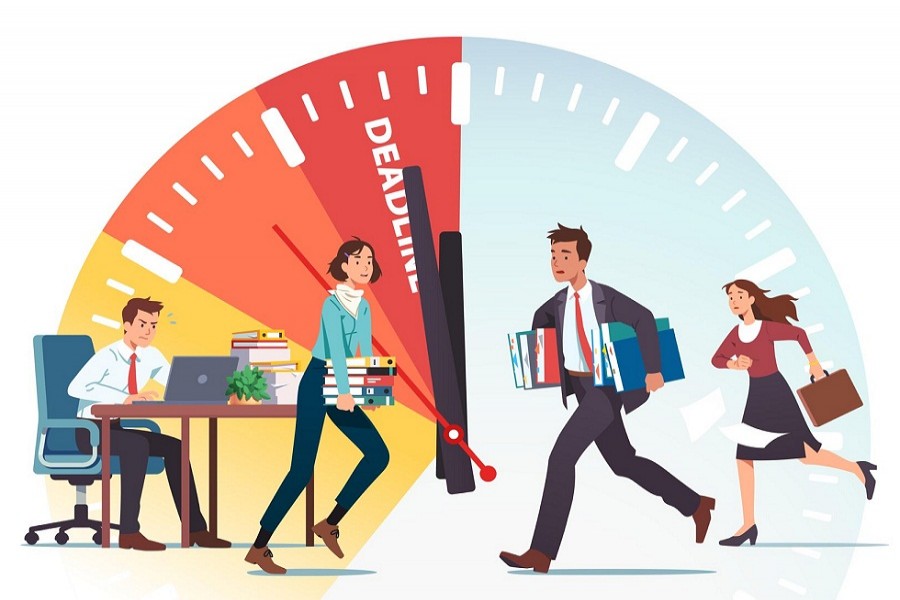
Published :
Updated :

In today’s fast-paced and highly competitive world, the definition of work and productivity has dynamically evolved. Nowadays, it is a norm to chase deadlines and take on a myriad of tasks till we reach the peak of our productivity believing that to be successful.
Imagine waking up to countless email notifications on your phone only reminding you of the hectic day at work you need to be preparing for. Working straight from 9 to 6, trying to meet deadlines, and when you are finally done, it still follows you back home with you scheduling and answering emails for the next day.
Trying to squish in enough time for entertainment, self-care and family during that small window of break seems like a big challenge. And before you know it, the next day it’s the same all over again.
This cycle of continuously working and trying to meet the societal standards of exerting oneself beyond his or her capacity in pursuit of professional goals is termed as the hustle culture.
This culture believes in working till we reach the peak of our productive capacity while maximising every minute of every single day.
Hustle culture promotes the type of workaholism whereby it has become habitual to feel an urgency to complete tasks as they come, even if it is when you finally got some time off to sit and have a cup of tea with your family or even in the middle of the night while you are trying to enjoy a Netflix show.
It does not really matter how many deadlines you already met, there will always be another one to meet making this a never-ending chase of continuously working to please your workplace and your conditioned sense of achievement.
At the end of the day, productivity only comes down to the number of hours worked and your ability to handle a dozen things all at the same time. Millennials and Gen Zs can definitely yield motivation from it but the question is, are we really hustling for the right reasons?
Ms Aniqa Redwan, a marketing strategist for a leading company in Bangladesh, stated the following-
“Oftentimes I have to stay up till late at night or even work during holidays when needed. I often feel like if my coworker is staying up late or working on a holiday, I should do so too or else I feel guilty for not working as hard as others.”
“Sometimes this continuous work stress makes it very difficult to get some time for myself and my family and not to mention, takes a toll on my mental and physical health as well,” added the marketing professional.
The societal standards of always giving high priority to all the tasks and overworking to exert your maximum potential till you are drained of all your energy have evidently conditioned people to believe in the association of productivity with the number of hours worked.
Even though it helps individuals to grow the ability to work under pressure, it may also sometimes tone down the productivity as well as mental energy to go on.
Dr Shanjida Naznin is a certified psychologist and a practising doctor of Marks Medical College and Hospital. In a conversation with the writer, she explained how this hustle culture can lead to unpleasant consequences.
“Too much work stress and the mentality to put work before health can lead to severe mental and physical shortcomings in the long run.”
She further remarked that in behavioural psychology, such culture is considered to be the result of variable ratio schedules where people tend to get rewards in random intervals for completing a task successfully.
Hence, once individuals are successful in achieving an initial goal, they become addicted to the habit of working longer hours to bag an even bigger win.
Even though the habit of going on, no matter what, is relatively motivating and positive, the downside appears when the same habit starts to take a toll on the individual’s health.
Continuous work stress may release stress hormones and the existence of a high level of such hormones for a prolonged period in the body can lead to health issues such as anxiety, heart diseases, depression, memory loss and more.
Hence, while the notion of more work means more efficiency is extremely common in fast-paced work environments, we need to be able to clearly differentiate between healthy and unhealthy work habits.
It is undeniably true that hard work results in success, however, productivity is only healthy when it is not at the cost of our mental and physical wellbeing.
Excessive work stress and the absence of mental peace can only rarely result in quality work. Even though hustle culture promotes striving hard to achieve bigger things in life, we must realise there is a fine line between overworking and success and so be able to create a desirable work-life balance.


 For all latest news, follow The Financial Express Google News channel.
For all latest news, follow The Financial Express Google News channel.